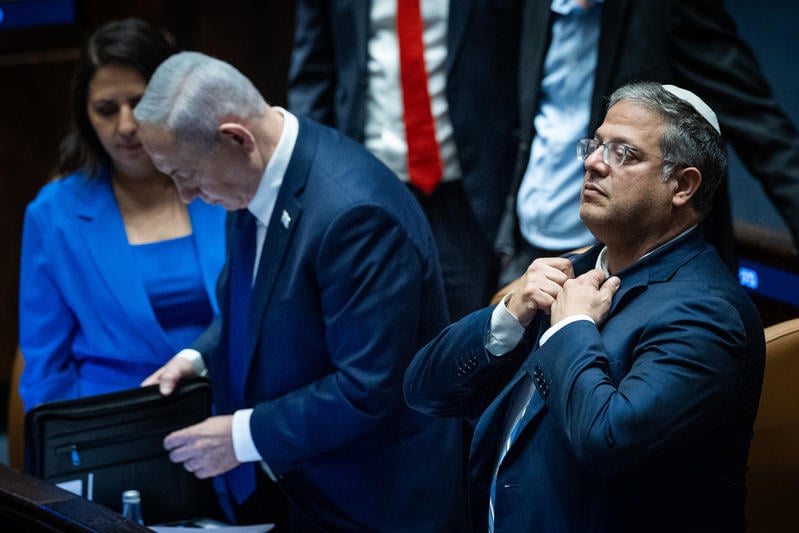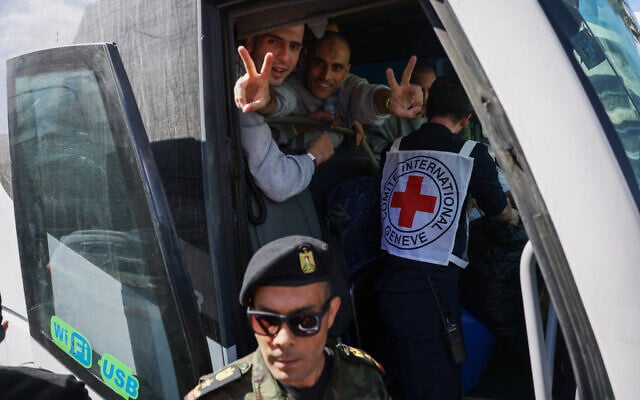Knesset advances bill mandating death penalty for terrorists who killed Israelis

Lawmakers on Monday evening voted 39-16 in favor of the first reading of a controversial government-backed bill sponsored by Otzma Yehudit MK Limor Son Har-Melech to impose the death penalty on terrorists who have killed Israelis.
Two other death penalty bills, sponsored by Likud MK Nissim Vaturi and Yisrael Beytenu MK Oded Forer, also passed their first readings 36-15 and 37-14.
Son Har-Melech’s bill stipulates that Israeli courts must impose the death penalty on those who have committed a nationalistically motivated murder of a citizen of Israel, while allowing judges serving on military courts in the West Bank to sentence offenders to death with a simple majority, rather than unanimous decision. The bill would also remove the possibility of regional military commanders commuting such sentences.
The bill states that it applies to those who kill Israelis due to “racism” and “with the aim of harming the State of Israel and the revival of the Jewish people in its land,” leading to criticism that it would apply only to Arabs who kill Jews and not to Jewish terrorists.
Although the death penalty formally exists in Israeli law, it has only ever been used once, in 1962 — in the case of Nazi officer Adolf Eichmann, one of the architects of the Holocaust.
It is technically allowed in cases of high treason, as well as in certain circumstances under martial law that applies within the IDF and in the West Bank, but currently requires a unanimous decision from a panel of three judges, and has never been implemented.
“Today, we took a historic step towards true justice and strengthening deterrence against terrorism. The death penalty law for terrorists, which passed its first reading, is a moral and national expression of a people that refuses to accept a reality in which murderers of Jews live in prison and expect deals,” said Son Har-Melech.
The bill will now be referred to committee to be prepared for the final two readings it must pass to become law. After the vote on Son Har-Melech’s bill, Otzma Yehudit chairman and National Security Minister Itamar Ben Gvir began giving away baklava until the food was confiscated by Knesset ushers.
The handing out of baklava has sometimes been seen on Palestinian streets when rejoicing in deadly attacks on Israelis, and has become synonymous in Israel with the celebration of such murderous violence.
“Those who murdered, raped, and kidnapped our sons and daughters do not deserve to see the light of day, and their sentence should be death,” Ben Gvir said in a statement. “The death penalty law is not only a moral and just step, but also critical to the security of the state.”
הצעת חוק עונש מוות למחבלים אושרה בקריאה ראשונה, בן גביר חילק בקלאוות במליאה pic.twitter.com/A6Yfaq53GK
— החדשות – N12 (@N12News) November 10, 2025
Except for Avigdor Liberman’s Yisrael Beytenu party, which voted in favor, the votes were largely boycotted by the opposition, with all of Blue and White and all but one of Opposition Leader Yair Lapid’s Yesh Atid party’s MKs staying away. Lapid had said earlier on Monday that he would not cooperate with Otzma Yehudit’s “political stunts.”
“A terrorist must die — on the battlefield or in court,” Liberman declared in a statement.
United Torah Judaism’s Degel HaTorah faction had earlier pledged to oppose the bill while all but two of the coalition Shas party’s lawmakers missed the late night vote. Degel HaTorah spiritual leader Rabbi Dov Lando warned that the bill “could lead to bloodshed,” sparking a public spat between his party and supporters of the measure.
‘I accuse them’
Paraphrasing former attorney general Gideon Hausner at the opening of the trial of Adolf Eichmann, Son Har-Melech told lawmakers on Monday evening that standing with her “are thousands of murder victims, but they cannot stand on their feet to point an accusing finger at the loathsome murderers and to cry out against the Palestinian terrorists — I accuse them.”
The far-right lawmaker said that she came to speak on behalf of “all the victims of Palestinian terror,” describing how she was moved to follow her current path following the murder of her husband in a terror attack in 2003.

The terrorist who led the cell that murdered Son Har-Melech’s husband Shalom went on to take part in other attacks, including October 7 — although two others implicated in the attack were released as part of the latest ceasefire deal, she said, asking how many people would have been saved had they been executed.
“When the message is unequivocal, without loopholes and without equivocation, the death penalty for terrorists law changes perception. It changes the paradigm. No more prisons. No more deals. No more suspended sentences. But a death sentence. Because it’s very simple: when a terrorist dies, he does not return to the circle of terror and will not be released alive,” she argued.
“No more mercy, no more hesitation. We choose life, and whoever chooses death will bear the consequences of his actions.”
“Our goal is to create a true deterrent [and] not a process in which we tell terrorists: ‘Go ahead and murder, you’ll be caught and later freed in another deal,’” agreed MK Forer.
“Had this law been approved before October 2023, maybe someone would have thought twice before doing what they did. Unfortunately, I can’t tell you I’m certain this proposal will reach its second and third readings. I’ve already seen the prime minister stop this legislation several times,” he continued.

Netanyahu’s about-face
In March 2023, lawmakers voted 55-9 in support of the bill in an initial reading, but it ultimately did not advance further despite having been part of the ruling Likud party’s coalition agreement with Otzma Yehudit, due to high-level opposition within the government and security services.
At the time, officials feared the passage of such a law will set back talks for the release of hostages in exchange for Palestinian terror convicts.
Flouting legal advice and a warning from the premier’s point man on the hostages, lawmakers in the Knesset National Security Committee voted in September to advance the bill — and late last month Ben Gvir, following the release of the last remaining living hostages, gave Netanyahu an ultimatum: advance the law to its first reading in three weeks or Otzma Yehudit will stop voting with the coalition.
Netanyahu subsequently gave his backing to the bill, paving the way for Monday evening’s vote.
‘Would not apply to all Jewish terrorists’
Opposition lawmakers warned against the the bill on Monday, with MK Gilad Kariv (The Democrats) arguing that its passage would “lead to an increase in terror attacks” and “bring about dramatic international pressure at a time when the State of Israel is already on the edge.”
Three Arab lawmakers were ejected from the plenum during the debate.
United Arab List (Ra’am) MK Waleed Taha was removed from the rostrum after an angry verbal exchange with coalition lawmakers who attempted to shout him down during a speech slamming the proposed law and accusing Israel of killing Palestinian civilians.
תיעוד: בן גביר ועודה התעמתו, משמר הכנסת התערב
במהלך דיון על חוק עונש מוות למחבלים התעמת השר איתמר בן גביר עם הח”כים הערבים וסדרני הכנסת נאלצו להפריד בינו לבין ח”כ איימן עודה pic.twitter.com/uA9QxyTOOS
— ערוץ 7 (@arutz7heb) November 10, 2025
Hadash-Ta’al chairman Ayman Odeh — who screamed that “the occupation will end and a Palestinian state will be established” — was then removed following a confrontation with Ben Gvir. The two traded insults, with Odeh calling Ben Gvir a terrorist. Ben Gvir then got up and approached Odeh, who was hustled away by security.
During a subsequent heated confrontation between Arab and far-right lawmakers, Hadash-Ta’al lawmaker Ahmad Tibi was also kicked out of the plenum by Son Har-Melech, who was chairing the debate.
Amir Fuchs of the Israel Democracy Institute told The Times of Israel that the text of the bill appears to apply only to those who kill Jewish Israelis and not Arab citizens.
“It would ‘catch’ all Arab terrorists as we know them and would not catch all Jewish terrorists. Of course, theoretically, it could be be that a Jew joins Hamas to murder Jews but this is just theoretical. In reality it would not apply to all Jewish terrorist murderers,” he said — adding that the bill could be considered unconstitutional both on discriminatory grounds and because it may violate Israel’s basic law on human dignity.

